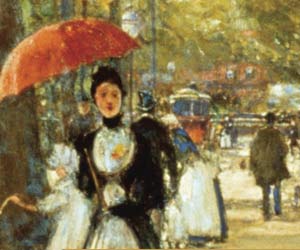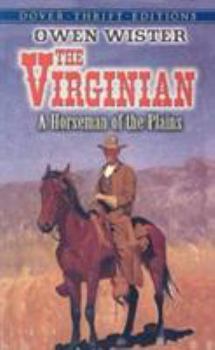The Virginian: A Horseman of the Plains
(Part of the Frontera (#17) Series and Colección Frontera (#17) Series)
Select Format
Select Condition 
Book Overview
Originally published in 1902, Owen Wister's The Virginian pre-dates the classic novels of Zane Grey and Max Brand and is considered by many to be the original Western. Dedicated to Wister's friend and... This description may be from another edition of this product.
Format:Paperback
Language:English
ISBN:0486449041
ISBN13:9780486449043
Release Date:April 2006
Publisher:Dover Publications
Length:293 Pages
Weight:1.80 lbs.
Dimensions:0.7" x 5.3" x 8.4"
Customer Reviews
5 ratings
This is how it all started: The American Western
Published by Thriftbooks.com User , 14 years ago
If you haven't read it, you should. It is a classic and the prototype of most subsequent westerns. Here you will find the Lone Ranger fighting for good against evil. Here also is High Noon for the Virginian has to settle the score on his wedding day in the usual way: Gun fight to the death. As a romance, it isn't bad either given the setting and the characters and as description of those times, it can't be beat because it was based on Owen's real life experiences. Of course, the past is a different country: they do things differently there. We will not see politically correct treatment of women, nor does the idea of lynching resonate well with modern sense and sensibilities. But that's the way things were and the truth is the truth.
Excellent!
Published by Thriftbooks.com User , 16 years ago
A "classic" is something that is almost universally considered to be excellent and is able to stand the test of time. This is a classic. It is an enjoyable story that will keep you interested and engaged in the characters and events. If you've seen the movies, please read the book because you've missed so much. It is wonderful summer reading! Highly recommended.
No doubt about it -- a great Western romance . . .
Published by Thriftbooks.com User , 20 years ago
For anyone fascinated by how the myth of the Western hero came into being, this is the book to read. Published in 1902, it became hugely popular for decades and inspired movies (a version with Gary Cooper in 1929) and a long-running TV series (1962-1971). A modern reader could easily guess the storyline without reading a synopsis - the classic elements are all there: tall, dark, handsome cowboy hero; pretty schoolmarm from back East; the villain who must finally face justice at the end of a gun. Few historical novels are dedicated to American presidents, however, and another whole dimension of the novel opens up with the name appearing on the dedication page -- Theodore Roosevelt, a college friend of the author's. What Wister does, besides telling a story of adventure and romance, is portray a particular kind of heroic figure, a natural man whose integrity is untainted by the corrupt (though civilized) values of the East. The book is a deliberate and often worshipful character study for the age of Teddy Roosevelt-style masculinity. The young Virginian charms us (and the narrator) with his courage and modesty and his thoughtful attempts to understand a world in which some men (even good ones) act dishonorably and make cowardly choices. Stoic and cool on the surface, the currents of sentiment run deep in this man. So does the will to self-improvement, as he reads Shakespeare and Sir Walter Scott. This book connects with so much of American myth over the last 100 years that you could easily write another book about it. Or you can simply enjoy it for what it is, a historical romance so well conceived, in spite of its sometimes dated views, that you keep on reading through each episode of the story, glad that Wister was in no hurry to cut to the chase. This is a book for any reader of Western literature, fiction or nonfiction. In it the many traditions of the western come together in popularized form for the first time. Readers who enjoy this book will also like Elmer Kelton's novel, "The Day the Cowboys Quit." While it's more historically accurate in its portrayal of working cowboys, it captures many of Wister's same narrative elements, in the courage, modesty and thoughtfulness of its hero, its portrayal of the relationship between a top hand and his boss, its fateful pursuit of cattle rustlers, an account of a troubled friendship between two men, and of course the loneliness and yearning at the heart of a man who loves a woman from afar.
A Real Classic
Published by Thriftbooks.com User , 21 years ago
When I was growing up, my Mother told me that she had been given this book by a beau, had read it and enjoyed it. This was in the early 1900s! When I saw it in a used Book Store about a year ago, I picked it up. I am just now reading it. I was totally surprised to find that it is beautifully written, presents a wonderful picture of a vanished time and people and is funny. I find myself smiling at the phrases that have become cliches - "When you call me that smile." and at the fact that I am getting as much pleasure from reading it as my Mother did all those years ago.
An English perspective
Published by Thriftbooks.com User , 23 years ago
Like another reviewer, I picked up my copy at a second-hand bookstall before going on holiday. I do this so that I can jettison the book when read without feeling I've wasted money. I recognised the title as that of a TV show, and was expecting an easy-read non-engaging story. How wrong I was. The story is hard to follow and demands concentration. After reading it "to see what happened in the end" I started at the beginning again to relish the writing and enjoy the situations. The story is about the Virginian, but the person who makes the longest journey is Molly. The man's rival is not another man, but another culture. Molly is in love with the man, but he is a cowboy. Although he is the most wonderful, handsome, wise man she has ever met, he wears chaps, carries a rope and a gun, and rides a horse all day. How can she ever possibly take him home to Bennington, where he will be a figure of fun. He will never fit in back home in Vermont. Although Wyoming is in the same country, it might as well be on the moon. Molly cannot bear the thought of the shame that must follow. It gets worse later when she finds out that the man has killed, and intends to kill again. Well, as you all know, love does eventually conquer all, and Molly gives in. The Virginian DOES fit in back East (a bit unbelievably I think) and all is well. Finally, the quality of writing is superb. Every sentence is worthy of that second read to get the best out of it. My favourite quote is "Has any botanist set down what the seed of love is? Has it anywhere been set down in how many ways this seed may be sown? In what various vessels of gossamer it can fall, and live unknown, and bide its time for blooming?" How true. I think the mark of good writing is how often the reader murmers "Yes, that's true." Well, this book is about cross-cultural relationships and marriage, and I think a lot of it strikes pretty true.
The Virginian: A Horseman of the Plains Mentions in Our Blog

The Gilded Age
Published by William Shelton • January 23, 2022
One of the most exciting, and prosperous, periods of American history came upon the heels of the most tragic time for our country. The Civil War and Reconstruction gave way to a generation where the amassing of tremendous wealth was the order of the day, conspicuous consumption the only guiding principle, and the gap between the "haves" and the "have nots" was the greatest that the United States would ever see.






